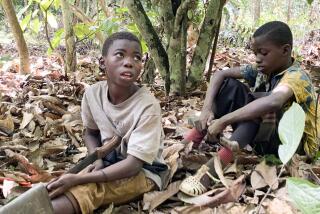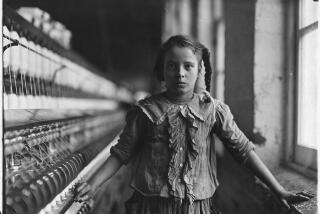Coalition’s Goal Is to End Use of Child Labor to Make Soccer Balls
- Share via
WASHINGTON — A coalition of labor, religious, consumer and child advocacy groups launched a campaign Friday to pressure the world governing body of soccer to halt the production of soccer balls by Pakistani children.
The initiative, dubbed the FoulBall Campaign, calls on the Federation Internationale de Football Assn. to withhold its endorsement of soccer balls produced by child labor. The organization currently endorses any ball that meets specific size, weight and leather-quality standards.
The campaign, announced at a Labor Department news conference, represents a new front in a growing effort to focus public attention on foreign-made consumer goods produced with child labor. The department is conducting hearings to gauge the extent of child exploitation by makers of imported clothing and other consumer goods.
The initiative is aimed primarily at Sialkot, a region in eastern Pakistan where most of the world’s soccer balls are produced. A 1994 Labor Department study found that 20% to 25% of the work on the 35 million balls the region produces each year is done by children younger than 16.
Dan McCurry, coordinator of the campaign, said that more than 3,000 Pakistani children under the age of 14 must work six days a week to hand-stitch enough soccer balls to satisfy the demand in the United States alone.
“We must begin here today with the FoulBall Campaign to loosen stitches and pull out the needles of bondage,” McCurry said.
Association leaders met for the first time last week in London with European trade unions to discuss the issue of child labor, but no decision was made about the organization’s endorsement, McCurry said.
Secretary of Labor Robert B. Reich said the FoulBall Campaign is a big first step in an effort to “reduce or eliminate the scourge of child labor.”
Reich said Pakistan’s human rights commission reported that children as young as 6 are used to sew soccer balls and that the typical workday of a child is eight to 10 hours long.
“These children are robbed of their labor,” Reich said, “but they are also robbed of their youth.”
McCurry said such labor is used because children are cheap and are more easily intimidated than adults. A typical child can sew about three soccer balls a day and is paid about 60 cents for each ball produced.
At the news conference, Rep. Barney Frank (D-Mass.) called the proposal “morally fair” and said that U.S. leaders and consumers need to do more than simply talk about the conditions. “For many of us,” Frank said, “this has been morally self-evident, but that hasn’t been enough.”
California Rep. George Miller (D-Martinez) said that if the federation will withhold its endorsement, consumers will be able to distinguish between balls that have been produced by underage workers and those that have not.
“If we are successful here, we can carry this through to the fashion industries,” he said.
Rep. Christopher H. Smith (R-N.J.) suggested that the United States apply more pressure by limiting aid and monitoring World Bank loans to Pakistan and other countries where there are similar labor practices. He also said the United States should increase donations to the International Labor Organization, a body made up of labor ministers from 173 nations, to advance stricter labor policies.
“It sends a chill down the back of your spine to know these balls were made by children,” Smith said.
Sen. Tom Harkin (D-Iowa) demonstrated his sentiments by whisking a red card from his pocket, imitating the signal a soccer referee uses to eject a player guilty of a flagrant violation.
Children, dressed in soccer uniforms, joined the men onstage, reading letters and singing songs of protest to show that, in the words of McCurry, “no longer will our children play with the labor of your children.”
Executives of Nike and Reebok, both of which have “stitching centers” in the Sialkot region, endorsed the campaign and said their companies are committed to building new factories that will obey child-labor laws and improving working conditions.
Peter Moore, Reebok senior vice president, said that company will also begin educational and rehabilitative programs for workers.
In a written statement, Brad Figel, a Nike executive, said his company will also expand health-care services, establish recreational facilities and provide literacy instruction for workers and their families.
At a Labor Department hearing after the news conference, Honduran Ambassador Roberto Flores Bermudez issued a statement pledging that his country will make efforts to eliminate abusive and exploitative child labor conditions in the production of goods exported to the United States.
The Honduran government has been criticized in recent months for allowing children to be used in producing clothing sold in the United States.
More to Read
Sign up for Essential California
The most important California stories and recommendations in your inbox every morning.
You may occasionally receive promotional content from the Los Angeles Times.













